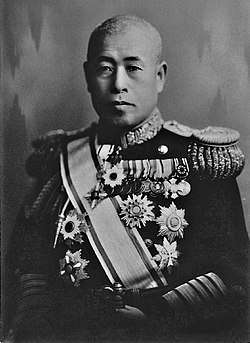Isoroku Yamamoto's sleeping giant quote
Isoroku Yamamoto's sleeping giant quotation is a film quote by the Japanese Admiral Isoroku Yamamoto regarding the 1941 attack on Pearl Harbor by forces of Imperial Japan.
The quotation is portrayed at the very end of the 1970 film Tora! Tora! Tora! as:
I fear all we have done is to awaken a sleeping giant and fill him with a terrible resolve.[1]
An abridged version of the quotation is also featured in the 2001 film Pearl Harbor. The 2019 film Midway also features Admiral Yamamoto speaking aloud the sleeping giant quote.
Although the quotation may well have encapsulated many of his real feelings about the attack, there is no printed evidence to prove Yamamoto made this statement or wrote it down. William Safire traces its origins to the phrase dubiously attributed to Napoleon, "China is a sickly, sleeping giant. But when she awakes the world will tremble". [2]
Overview
The line serves as a dramatic ending to the depiction of the sneak attack on Pearl Harbor, but it has yet to be verified that Yamamoto ever said or wrote anything resembling the "awaken a sleeping giant" quote. Neither At Dawn We Slept, the extensive history of the Pearl Harbor attack by Gordon Prange, nor The Reluctant Admiral, the biography of Yamamoto in English by Hiroyuki Agawa, contains the line.
The director of Tora! Tora! Tora!, Richard Fleischer, stated that while Yamamoto may never have said those words, the film's producer, Elmo Williams, had found the line written in Yamamoto's diary. Williams, in turn, has stated that Larry Forrester, the screenwriter, found a 1943 letter from Yamamoto to the Admiralty in Tokyo containing the quotation. However, Forrester cannot produce the letter, nor can anyone else, American or Japanese, recall it or find it. Randall Wallace, the screenwriter of the 2001 film Pearl Harbor, readily admitted that he copied the line from Tora! Tora! Tora!
Yamamoto did believe that Japan could not win a protracted war with the United States. Moreover, he seemed later to have believed that the Pearl Harbor attack had been a blunder strategically, morally, and politically, even though he was the person who originated the idea of a surprise attack on Pearl Harbor. It is recorded that while all his staff members were celebrating, "Yamamoto alone" spent the day after Pearl Harbor "sunk in apparent depression".[3] Although almost 2,500 Americans lost their lives at Pearl Harbor and surrounding areas in Honolulu, he was only upset by the bungling of the Foreign Ministry which led to the attack happening while the countries were still at peace, thus, along with other factors, making the incident an unprovoked surprise attack that enraged American public opinion.[4][5]
Similar sayings
In The Reluctant Admiral, Hiroyuki Agawa gives a quotation from a reply by Admiral Yamamoto to Ogata Taketora on January 9, 1942, which is similar to the famous version: "A military man can scarcely pride himself on having 'smitten a sleeping enemy'; it is more a matter of shame, simply, for the one smitten. I would rather you made your appraisal after seeing what the enemy does, since it is certain that, angered and outraged, he will soon launch a determined counterattack."[6]
The other common quotation attributed to Yamamoto predicting the future outcome of a naval war against the United States is, "I can run wild for six months ... after that, I have no expectation of success".[7] As it happened, the Battle of Midway, the critical naval battle considered to be the turning point of the war in the Pacific, did indeed occur six months after Pearl Harbor, as the Battle of Midway ended on June 7, exactly 6 months later.
Similar to the above quotation was another quotation. Yamamoto, when once asked his opinion on the war, pessimistically said that the only way for Japan to win the war was to dictate terms in the White House.[8] Yamamoto's meaning was that military victory, in a protracted war against an opponent with as much of a population and industrial advantage as the United States possessed, was completely impossible, a rebuff to the Kantai Kessen Decisive Battle Doctrine of those who thought that winning a single major battle against the United States Navy would end the war, just as the Japanese victory in the Battle of Tsushima ended the Russo-Japanese War in 1905.
Notes
- "December 7, 1941: The Sleeping Giant Wakes". Archived from the original on 2011-07-21. Retrieved 2009-10-12.
- Safire, William (2008). Safire's Political Dictionary. Oxford University Press. p. 666. ISBN 0195343344.
- The Reluctant Admiral, p. 259
- Haruko Taya Cook, Theodore F. Cook, Japan at War: An Oral History, New Press, New York, 1992, p. 83
- Morison 2001, pp. 176
- The Reluctant Admiral, p. 285
- Fumimaro Konoe, Konoye Ayamaro Ko Shuki (Memoirs of Prince Ayamaro Konoye), Asahi Shimbun-sha, 1946, p. 3.
- The Reluctant Admiral, p. 291.
References
- Prange, Gordon; Donald M. Goldstein; Katherine V. Dillon (1991). At Dawn We Slept: The Untold Story of Pearl Harbor. New York City: Viking. ISBN 0-07-050669-8.
- Agawa, Hiroyuki (1979) [1969]. John Bester (ed.). The Reluctant Admiral: Yamamoto and the Imperial Navy (1st English ed.). New York: Kodansha International. ISBN 0-87011-355-0.
- Suid, Lawrence H. (December 1964). "'A Terrible Resolve'". Proceedings of the Naval Institute. 543 (94 (6412)).
